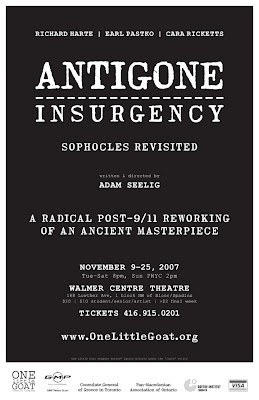 1) What the fuck is going on?
1) What the fuck is going on?
Exactly.
2) What is “poetic theatre”?
Theatre that attempts to find clarity through ambiguity. Not verse theatre. Nor prose theatre or journalistic theatre. It is theatre that treats the text as a score, and treats the gap between actor and audience not as an obstacle to bypass, but as a medium through which multiple meanings can emerge. There’s a difference between shining a light directly into the audience’s eyes, and having it pass through a prism.
3) What’s the story behind the title of One Goat Theatre’s latest play: Antigone: Insurgency (Sophocles Revisited)?
Sophocles’ play is the tragedy of national security. Post-9/11, it has an enormous amount to say, and by recontextualizing it for Toronto, today (as I did when rewriting the play), it couldn’t be more current.
Post-WWII, under the influence of Bertolt Brecht and Jean Anouilh’s monumental versions of the tragedy, and in the wake of Hitler, Mussolini et al, Antigone was lionized as the quintessential anti-fascist, a “freedom fighter”. Post-9/11, however, “freedom fighting” has become virtually synonymous with terrorism. So like it or not, Antigone and insurgency go hand in hand, regardless of how commendable or condemnable that insurgency may be.
4) What can we learn from the Ancient Greeks about contemporary geopolitical security issues?
That today’s problems of national security in “free societies” are the same problems that have plagued democracy since democracy was invented. Strict counter-terrorism laws can victimize some (like Maher Arar) while radicalizing others (especially the young: think of Toronto’s own alleged terrorists, or the car-burning rioters of Paris) . . .
5) How did you choose the cast for this play?
Very very carefully! They’re superb: Richard Harte, Earl Pastko and Cara Ricketts.
 6) Through your intensive study of them, have you arrived at any unifying theories about Samuel Beckett’s manuscripts?
6) Through your intensive study of them, have you arrived at any unifying theories about Samuel Beckett’s manuscripts?
Beckett is remarkably consistent: he writes himself out of his texts. From following that process repeatedly in his manuscripts, I discovered – as a writer – that to write is to go, impossibly, beyond yourself. The best you can do is “fail better” with each composition.
(Looks like some Beckett-heads posted my essay on the manuscripts online: here.)
7) In terms of the day-to-day realities of working as a theatre artist, how would you compare Toronto to New York?
Exceptional talent in both, no doubt. New York, by virtue of its population, tends to have more ‘specialists’; Toronto, more ‘generalists’. But to come to your next question . . .
8) If you could change just one thing about theatre in Toronto, what would it be?
More world stage events! The one considerable advantage that New Yorkers have over Torontonians is abundant exposure to international performance of the highest calibre through venues like the Brooklyn Academy of Music.
9) What is it about Yehuda Amichai’s poetry that compels you to keep returning to it for theatrical inspiration?
It’s not Amichai’s poetry that I’ve staged, incidentally, but his barely known dramatic works, some of which rival his very best poetry. I’ve always avoided stage adaptations of poetry intended for the page. As for Amichai, I grew up with his poems, so his dramatic works struck me as a great first project for One Little Goat when I started the company, in New York, in 2002.
10) Which came first, your interest in poetry or your interest in theatre?
Music.
“There’s a difference between shining a light directly into the audience’s eyes, and having it pass through a prism.”
What a lovely and evocative image this is. Your writing throughout this interview is at once spare and loaded with content. It’s an enviable combination.
What a relief to know that this theatre is out there and in here. Thanks to all to do it, have it and send it.
Coming to Vancouver anytime soon?